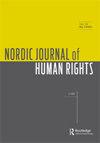Reparations for Chattel Slavery: A Call From the ‘Periphery’ to Decolonise International (Human Rights) Law
IF 1.2
Q3 POLITICAL SCIENCE
引用次数: 0
Abstract
ABSTRACT Global inequities persist despite the achievements of the human rights project so far, as Kofi Annan highlighted in 2005. Caribbean calls for reparations for chattel slavery are a manifestation of and a response to global inequities that affect the Global South in particular. However, when endeavouring to find a footing in international law, and specifically in international human rights law, reparations calls have been contested and challenged. This article proposes a reimagining of the international human rights system to offer a legitimate place for reparations for chattel slavery and thus enable an effective challenge to pressing injustices such as racial discrimination and its ramifications. Despite being a region that has been birthed from such profound historical injustices that still affect the full realisation of human rights today, the Caribbean and its human rights challenges and calls for justice have been relegated to and maintained at the periphery of international human rights law. For that reason, this article focuses on reparations for slavery emanating from the Caribbean. Drawing on Third World Approaches to International Law (TWAIL), it argues that the inability of international legal systems to respond to historical injustices indicates that the colonial imagination, constructed on the compass of exclusion, is still the foundation of international human rights law and of modern, postcolonial societies. The article thus advocates for decolonising international human rights law to accommodate a more inclusive future for human rights.奴隶制赔偿:从“边缘”到非殖民化国际(人权)法的呼吁
正如科菲·安南在2005年所强调的那样,尽管人权项目迄今取得了成就,但全球不平等现象依然存在。加勒比地区要求对奴隶制进行赔偿的呼吁是对全球不平等现象的一种表现和回应,这种不平等现象尤其影响到全球南方。然而,在努力在国际法,特别是在国际人权法中找到立足点时,赔偿要求受到了质疑和挑战。本文建议重新构想国际人权制度,以便为动产奴役的赔偿提供一个合法的场所,从而能够有效地挑战紧迫的不公正现象,如种族歧视及其后果。尽管加勒比是一个从深刻的历史不公正中诞生的区域,这种不公正今天仍然影响着人权的充分实现,但加勒比及其人权挑战和对正义的呼吁已被降至国际人权法的边缘,并处于边缘地位。因此,本文主要讨论加勒比地区对奴隶制的赔偿。它借鉴第三世界的国际法方法(TWAIL),认为国际法律体系无法对历史上的不公正作出反应,这表明以排斥为指导的殖民想象仍然是国际人权法和现代后殖民社会的基础。因此,该条主张国际人权法非殖民化,以适应一个更加包容的人权未来。
本文章由计算机程序翻译,如有差异,请以英文原文为准。
求助全文
约1分钟内获得全文
求助全文
来源期刊

Nordic Journal of Human Rights
POLITICAL SCIENCE-
CiteScore
1.00
自引率
25.00%
发文量
29
期刊介绍:
The Nordic Journal of Human Rights is the Nordic countries’ leading forum for analyses, debate and information about human rights. The Journal’s aim is to provide a cutting-edge forum for international academic critique and analysis in the field of human rights. The Journal takes a broad view of human rights, and wishes to publish high quality and cross-disciplinary analyses and comments on the past, current and future status of human rights for profound collective reflection. It was first issued in 1982 and is published by the Norwegian Centre for Human Rights at the University of Oslo in collaboration with Nordic research centres for human rights.
 求助内容:
求助内容: 应助结果提醒方式:
应助结果提醒方式:


